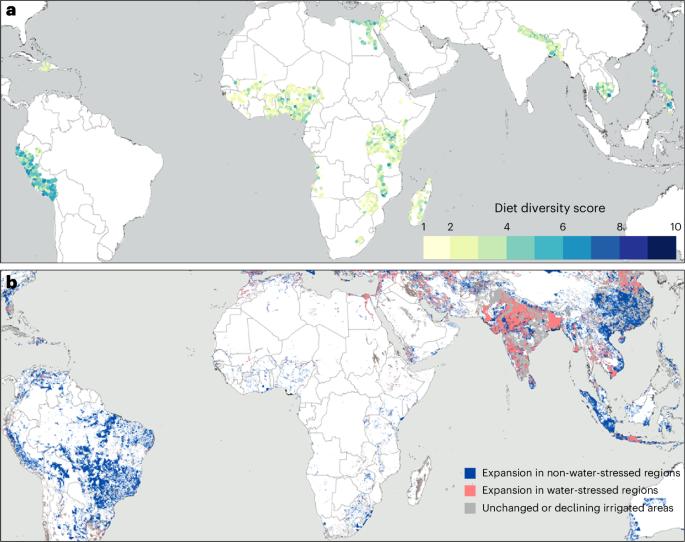Child diet diversity and irrigation expansion in the global south
IF 27.1
1区 环境科学与生态学
Q1 ENVIRONMENTAL SCIENCES
引用次数: 0
Abstract
Irrigation expansion has been promoted as a way to improve global nutrition and health by increasing food production and income. However, its impact on the health and nutrition of local communities is unclear and might vary substantially across contexts, depending on who reaps the benefits and how. Here we combine georeferenced survey data from 9,144 rural communities (70,817 households) across 26 global south countries with data on global patterns of irrigation infrastructure changes to examine linkages between irrigation expansion and local changes in child diet diversity—a key indicator of micronutrient intake and development. We found a positive link between irrigation and child diet diversity, with substantial regional differences. Irrigation benefits were concentrated in regions without sufficient water resources to support it, suggesting trade-offs between dietary improvements and water stress. By contrast, irrigated areas with sufficient water tend to produce higher fractions of cash crops and export-oriented food items, with weaker associations to improved local diets. These findings suggest that while irrigation access is associated with overall improvements of child diet diversity in rural communities, water stress conditions can influence these outcomes. Nutrition-sensitive strategies thus need to be considered as an essential component of sustainable irrigation planning in the future. Irrigation is an important component of agricultural productivity, but its influence on health and nutritional outcomes—especially those of children—remains unclear. This study examines the links between irrigation expansion and child diet diversity across 26 countries in the global south.

全球南部地区儿童饮食多样性和灌溉扩张
扩大灌溉被视为通过增加粮食生产和收入来改善全球营养和健康的一种方式。然而,它对当地社区的健康和营养的影响尚不清楚,而且在不同情况下可能有很大差异,这取决于谁受益以及如何受益。在这里,我们将来自26个全球南方国家的9144个农村社区(70817户家庭)的地理参考调查数据与全球灌溉基础设施变化模式的数据结合起来,研究灌溉扩张与当地儿童饮食多样性变化之间的联系——儿童饮食多样性是微量营养素摄入和发育的关键指标。我们发现灌溉与儿童饮食多样性之间存在正相关关系,存在显著的区域差异。灌溉的好处主要集中在没有足够水资源支持的地区,这表明在饮食改善和水资源紧张之间存在权衡。相比之下,水充足的灌溉区往往生产更多的经济作物和出口导向型食品,与改善当地饮食的联系较弱。这些发现表明,虽然灌溉渠道与农村社区儿童饮食多样性的总体改善有关,但水资源压力条件可能会影响这些结果。因此,需要将营养敏感战略视为未来可持续灌溉规划的一个重要组成部分。灌溉是农业生产力的重要组成部分,但其对健康和营养状况的影响——尤其是对儿童的影响——尚不清楚。这项研究调查了全球南方26个国家灌溉扩张与儿童饮食多样性之间的联系。
本文章由计算机程序翻译,如有差异,请以英文原文为准。
求助全文
约1分钟内获得全文
求助全文
来源期刊

Nature Sustainability
Energy-Renewable Energy, Sustainability and the Environment
CiteScore
41.90
自引率
1.10%
发文量
159
期刊介绍:
Nature Sustainability aims to facilitate cross-disciplinary dialogues and bring together research fields that contribute to understanding how we organize our lives in a finite world and the impacts of our actions.
Nature Sustainability will not only publish fundamental research but also significant investigations into policies and solutions for ensuring human well-being now and in the future.Its ultimate goal is to address the greatest challenges of our time.
 求助内容:
求助内容: 应助结果提醒方式:
应助结果提醒方式:


